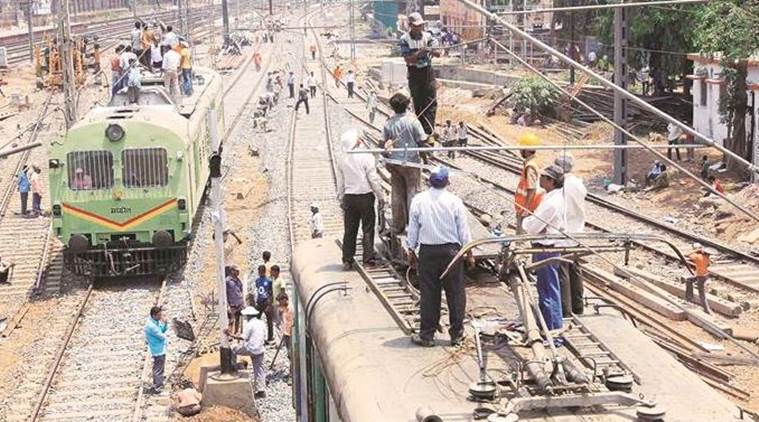Stay updated with the latest - Click here to follow us on Instagram
Mega blocks: Weekend maintenance regime for smooth suburban railway in Mumbai
A mega block refers to stoppage or curtailing of services ranging between four and five hours.
 A block needs to be planned at least seven days in advance, and nearly 300 personnel on the ground carry out the work for which the block is executed. Express Archive.
A block needs to be planned at least seven days in advance, and nearly 300 personnel on the ground carry out the work for which the block is executed. Express Archive.
IT’S now a Sunday routine for Mumbai’s suburban railway commuters to first check if there’s a mega block on the railways. A mega block basically refers to stoppage or curtailing of services ranging between four and five hours, typically for maintenance of technical or electrical equipment.
According to senior railway officials, any department that seeks to operate a mega block needs to justify it to the respective Divisional Railway Manager (DRM). A block needs to be planned at least seven days in advance, with nearly 300 personnel on the ground carrying out the work for which the block is executed.
“We cannot ask for a block of train services casually. There has to be definite set of tasks and goals for each mega block. Various departments of the railways including the operating, technical, signalling and telecommunication and other departments under engineering co-ordinate for a block,” a senior railway official said.
Before the concept of Sunday mega-blocks were introduced, the railways used to observe a temporary suspension of services whenever needed. “Then in 1998-99, a rail roko was staged at Thane station due to disruption of services. The ministry, then headed by minister Ram Naik, made it obligatory to do maintenance every Sunday, making mega-blocks a reality,” a senior railway official said.
Earlier, railway blocks would be between 10 am and 5 pm on a Sunday. After commuters complained about the inconvenience, they were shortened to four-five hours, from 11 am to 4 pm. Renewing tracks, changing ballast (stones on tracks), changing overhead equipment (OHE), signal checking or girder launching for bridges are among the major reasons for mega-blocks. Officials say they also check equipment used during a block a day ahead to save time.
“Maintaining equipment we use to the maximum extent remains our goal. Thus, taking a block becomes necessary. The work schedule of gangmen is also prepared in such a way that they have to work on Sunday mega-blocks every alternate week,” an official said. For a trackman, working on Sunday mega blocks is more comfortable than working in the night hours between 1 am and 4.30 am when services are not functional.
“Working in the daylight is always peaceful. We are less stressed as there are more people to help us. Chances of accidents are also fewer as train services remain completely suspended as opposed to night blocks when passenger trains continue,” said an official.
Lately, train services on both the Central and Western Railways have been witness to traffic disruptions due to railway fractures, equipment failure or signalling issues. Multiple rail rokos have been staged by commuters groups who have complained against the delay of train services in the morning peak hour in spite of observing maintenance blocks every Sunday.
“We completely support the initiative of railways to undertake mega blocks. Though the blocks are observed, the frequency of rail disruption cases on suburban train services due to technical issues remains rampant. There must be a quality check on the blocks by the railways and its results must be shared with commuters to apprise us of the work undertaken,” said Subhash Gupta, member of Railway Pravasi Sangh.







